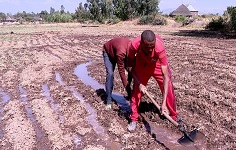The number of regions in Ethiopia and volumes of land covered with irrigation wheat farming in has been showing an increase over the past few years.
After a few months during the current irrigation period, Ethiopia expects to harvest 16 million quintals of wheat by covering 400,000 hectares of land using irrigation, according to the Ministry of Agriculture of Ethiopia.
After proven to be effective in some Oromia and Afar areas, irrigation wheat farming has now expanded into Amhara and Southern, and Somali regions of Ethiopia. In Western Gojam Awi zone of Amhara region, which has huge ground water, 7,000 hectares of land is being covered with wheat farm, according to the Ministry of Agriculture of Ethiopia. The zone expects to produce 315,000 quintals of wheat by irrigating the 7,000 hectares of land.
Indicating that Awi zone has 31,150 hectares of land suitable for irrigation, Asaye Feleke, Deputy head of Agriculture for Awi Zone indicated that out of this land, the zone is working to cover 12,500 hectares with wheat using irrigation system. In addition to wheat, using different water sources the smallholder farmers are set to engage in irrigation farming of fruits and vegetables, according to Mr. Asaye.
The Ministry’s report shows that within Awi Zone, Bure area 400 smallholder farmers are using 40 heavy duty water pumps to produce wheat on 85 hectares of land.
The Ministry of Agriculture also reported this week that in Silte Zone of Southern Ethiopia region a total of 1186 hectares of land is being covered with wheat using irrigation. The zone expects some 40,000 quintals of wheat from this farm, according to the report of the Ministry which indicated that the expansion of irrigation wheat farms will contribute to food security of Ethiopia.
As the majority of people engaged in crop production are smallholder farmers who rely on rainwater to produce once in a year, Ethiopia has not been able to become food self sufficient for the past decades.

The irrigation farming of wheat program initiated a few years ago by the reformist Prime Minister Abiy Ahmed in selected areas has proven that Ethiopia has huge potential to maximize its crop production using irrigation farming.
During the current irrigation period the Ministry of Agriculture expects to cover a total of 400,000 hectares of land with wheat farms using irrigation, according to Meles Mekonnen (PhD), State Minister of Agriculture of Ethiopia.
The Minister stated that a total of 16 million quintals of wheat is expected after a few months when this irrigation season ends. He indicated that using irrigation farming up to mid-December 2021 a total of 250,000 hectares of land was covered with wheat. The Ministry has facilitated provision of inputs and technologies to the smallholder farmers currently engaged in irrigation farming of wheat.
In addition to wheat irrigated wheat farming, Ethiopia has covered a total of 300,000 hectares of land with fruits, vegetables and other root crops, according to the Minister.To address its food self-insufficiency,
Ethiopia has been relying on foreign food aid and purchasing wheat from abroad spending hundreds of millions of hard currencies. Now the government of Ethiopia aims to make wheat import and foreign food aid history in the coming few years by expanding irrigation farming across the nation.

